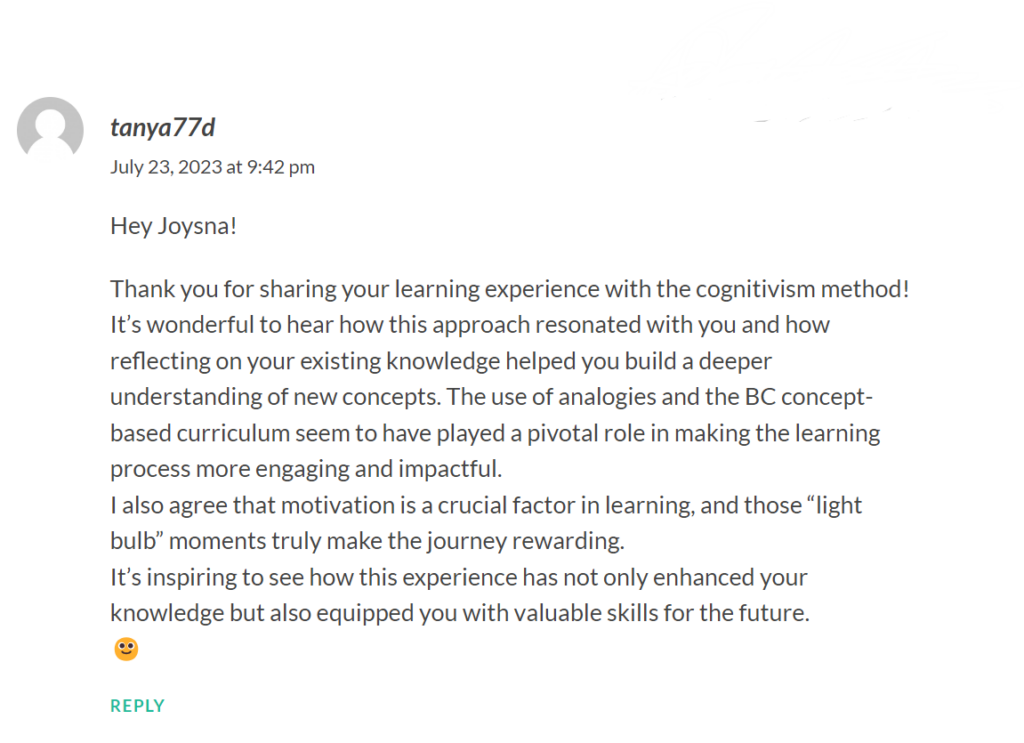Prompt: Describe an example from your life of when you were taught using each method described in this article: behaviorism, cognitivism, and constructivism.
In retrospection, I have encountered the three learning theories throughout my learning journey and they have vastly shaped and influenced my personal development and professional growth as an educator.
For me, behaviorism was the most evident in my early days of schooling, perhaps when I was a toddler. Our good behaviour was rewarded and reinforced, and the ‘undesired’ behavior was condemned. I distinctly remember my elementary teacher used to give me those tiny sparkly stickers as a sign of her appreciation and it used to be a big deal back then to have received one. I was no exception, just like everyone else I also used to look forward to those moments of appreciation. I will say though that this method was successful in fostering a deep sense of discipline and responsibility in me.
When I began middle school, problem-solving, independent thinking, and critical thinking became the more resorted approaches. It was through group discussions and sometimes, even debates that we tried to unlock the mysteries of science and the dilemmas of social science. Sadly, I had to leave the enchanting logic of fairy tales behind and embrace the lens of reality. Cognitivism here allowed me to construct my own rhyme and reason with logical thinking. My curiosity for learning was definitely instilled by my Social Science and English teachers, who made it a point to involve their students in instigating discussions that really made us think and analyze before we digested or integrated any learning.
After moving to university to study English literature, Shakespeare and Milton among other great authors really challenged my world view and it was here that I more actively started connecting the dots between my favorite authors’ views and what I witnessed in my reality. The challenging yet intriguing perspectives of the philosophers, novelists, and dramatists made me reflect more keenly than ever before I put together and devised my own knowledge and learning of this world. As “memory is always under construction as a cumulative history of interaction” (Ertemer & Newby, 2013, p.141), the Constructivist approach cultivated in me critical thinking skills and facilitated a comprehensive understanding of worldly sophisticated ideas which I can say will always be a ‘work in progress’.
Thanks to all these wonderful learning experiences, I stay committed to learning as a life-long learner. Needless to say that these three learning theories are still an integral part of my learning. I come across them in my day-to-day existence. Even when I am watching news I am cautious about what I believe and digest, and what I discard as it might not appeal to my cognitive faculties.
All in all, these learning theories have largely contributed to my well-rounded development. They have not just contributed to my academic prosperity but equipped me with valuable life skills and attitudes that extend to both the private and professional spheres of life.
Response to Joysna’s Blog post:

REFERENCES
Ertmer, P. A., & Newby, T. J. (2013). Behaviorism, cognitivism, constructivism: Comparing critical features from an instructional design perspective. Performance Improvement Quarterly, 26(2), 133-148.
Hi Tanya! I just wanted to drop you a quick note to say how much I enjoyed reading your blog post about the three different learning theories. It was so interesting to hear about your personal experiences with each one and how they impacted your own learning. I found myself nodding along as I read, as I could definitely relate to some of the insights you gained. Thanks so much for sharing your story!
Hello Tanya,
Thank you for sharing your different learning experiences. I can relate to the sentence you wrote whereby the teacher made ” a point to involve their students in instigating discussions that really made us think and analyze before we digested or integrated any learning”. It is really valuable when you get the opportunity to reflect upon how you are learning, these are transferable skills that helps us in life in general as well.
Thanks for sharing!